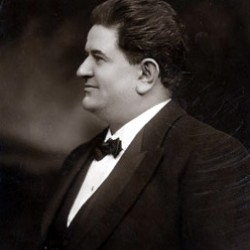
Falstaff in Scotland
Posted 6 Sep 2021
Verdi's Falstaff was first performed in Scotland at Edinburgh's Lyceum Theatre on 11 September 1894. This took place only some eighteen months after the Milan premiere of this, Verdi's final operatic work.
The performers were Sir Augustus Harris's Royal Italian Opera Company. The cast was led by the American baritone David Bispham in the title role. Of greatest interest is the fact that the baritone and tenor singing Ford and Fenton in Edinburgh were Antonio Pini-Corsi (pictured) and Paolo Pellagalli-Rossetti. They had created these roles in the premiere at La Scala, Milan.
Other soloists included Sofia Ravogli (Alice), her sister Giulia (Quickly) and Pauline Joran (Nannetta).
The first Scottish performances in English were given by the British National Opera Company (BNOC) in 1928 at His Majesty's Theatre Aberdeen, followed by visits to Glasgow and Edinburgh. The conductor was John Barbirolli, with leading roles filled by Arthur Fear (Falstaff), Agnes Nicholls (Alice), Percy Heming (Ford) and Heddle Nash (Fenton). The production returned the following year under the banner of the Covent Garden Opera (successors to the now-defunct BNOC).
After another lengthy gap, the next series of performances came with the visits of Glyndebourne to the Edinburgh International Festival. In 1955 Carl Ebert's staging, in designs by Osbert Lancaster, was conducted by Carlo Maria Giulini. On this occasion, Fernando Corena sang the title role, supported by Anna Maria Rovere (Alice), Eugenia Ratti (Nannetta), Oralia Dominguez (Quickly) and Juan Oncina (Fenton). The production was revived in 1960, with Vittorio Gui on the podium. This time Geraint Evans was singing a part he would go on to make very much his own. Juan Oncina and Oralia Dominguez repeated their roles, while Alice was played by Ilva Ligabue with Sesto Bruscantini as Ford.
Scottish Opera mounted its first production in 1966. Alexander Gibson conducted. Peter Ebert, who had assisted his father in 1960, directed in attractive designs by Peter Rice. Geraint Evans repeated his Falstaff, while other cast members included Luisa Bosabalian (Alice), Elizabeth Robson (Nannetta), Elizabeth Bainbridge and John Shaw, from Covent Garden, as Quickly and Ford.
Ryland Davies sang Fenton with Francis Egerton and Ian Wallace as Bardolph and Pistol respectively. This production was revived in 1976, with Sesto Bruscantini, Ford in 1960, taking on the title role. Catherine Wilson was Alice, with Bainbridge and Shaw returning. In the summer this cast gave a concert performance at the Royal Albert Hall as part of the BBC Proms.
The second Scottish Opera production in 1991 was conducted by John Mauceri and directed by Ian Judge. The Scottish baritone Gordon Sandison played Sir John. Maria Prosperi was Alice, with Susannah Waters (Nannetta), Sarah Walker (Quickly) and John Mark Ainsley (Fenton).
A third Scottish Opera staging appeared in 2008, directed by Dominic Hill, with Peter Robinson conducting. Peter Sidhom played Falstaff, with Maria Costanza Nocentini (Alice), Lucy Crowe (Nannetta) and Sally Burgess (Quickly).
The fourth and most recent production, in 2021, made cunning use of the restrictions imposed by the Covid-19 pandemic, with a spacious set and clever use of social spacing. The director and designer was Sir David McVicar, who used the subsidiary source, the Henry IV plays, to draw out the elements of seriousness in the plotting.
Stuart Stratford conducted, with a cast led by Roland Wood. Alice was Elizabeth Llewellyn, with Gemma Summerfield (Nannetta), Louise Winter (Quickly), Phillip Rhodes (Ford), Jamie Macdougall (Bardolph) and Alastair Miles (Pistol).
Archive
2025
December
2024
November
March
2023
November
March
January
2022
August
July
2019
October
2018
September
February
2017
November
2016
November
October
September
May
March
February
2015
December
October
September
March
2014
October
March
2013
November
February
2011
December
November
September
August
June